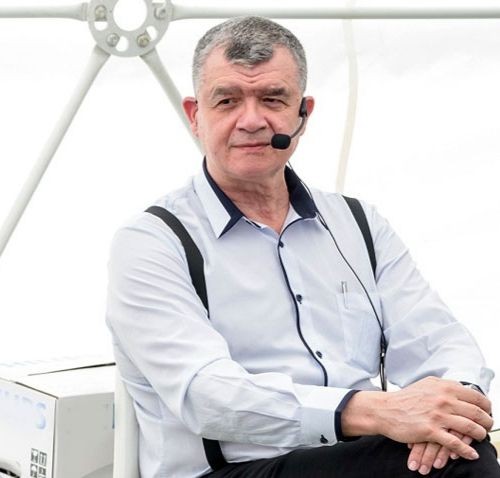A device as big as a telephone receiver can detect the presence of Covid-19 even before the virus could be detected by a PCR. It has been developed by a team of Italian, Spanish and Bulgarian scientists and is already used in diagnosing and tracking the infection.
Eight exhalations into the device are sufficient to conclude whether inflammation has occurred in the airways. In this way, the temperature of the lungs can be measured and а newly emerged infection can be caught early. With a coronavirus infection, like the flu, the temperature is thought to rise before clinical symptoms appear.
“It is a device that we can conditionally call a thermometer for the lungs”, explains Prof. Todor Popov from the Saint Ivan Rilski University Multi-Profile Hospital, a leading scientist in the international project. “In principle, there are various types of thermometers and they give us an idea of whether there is any inflammation in the body. However, when we measure the temperature of the exhaled air, we get information not only about the general temperature of the body, but also about the condition of the respiratory system and how much inflammation there is in it.”
The device is designed for patients with asthma, because the disease causes inflammation of the respiratory tract and therefore the temperature rises. And since a similar process takes place with a Covid-19 infection, the international team decided to use the already licensed equipment to monitor the dynamics of the temperature. This is done not only in Italy and Spain, where there are many more patients, but also in Bulgaria.
In Bulgaria, first the so-called thermometers were given out to people in contact with coronavirus patients. With the help of these devices, they measure their temperature in the morning and evening, and the values are automatically registered on a special website and it is monitored whether an infection will develop in their lungs.
 “Here we are talking about telemedicine, about remote measurement of the most modern type”, says Prof. Todor Popov. “In this way the patient does not come into contact with another person and avoids infecting them, and we understand how the infection progresses and try to track it over time. When did the temperature of the exhaled air start to rise, when did the symptoms appear – things that are important from the point of view of disease control.”
“Here we are talking about telemedicine, about remote measurement of the most modern type”, says Prof. Todor Popov. “In this way the patient does not come into contact with another person and avoids infecting them, and we understand how the infection progresses and try to track it over time. When did the temperature of the exhaled air start to rise, when did the symptoms appear – things that are important from the point of view of disease control.”
In the opinion of Prof. Todor Popov, the coronavirus epidemic in Bulgaria is subsiding, but whether this will be a lasting trend and a new wave will not follow, no one can predict.
"Talking about things that we still do not understand, in what way they will manifest themselves, apart from being irresponsible, is also a sign of excessive self-confidence”, adds Prof. Todor Popov. “I personally do not attempt to make guesses about something different from our previous experience. In the absence of sufficient other information, precautions are the only way in which we can limit the infection. The coronavirus undergoes changes over time and is certainly affected by the season. This is something new for all of us. ”
English Rossitsa Petcova
Photos: BNT and libraryA Christmas tree with Bulgarian decorations has been placed in a central location at the Griffin Museum of Science and Industry in Chicago. For the fifth consecutive year, Bulgarians living in Chicago crafted the lavish decoration of the Bulgarian..
The usurpation of cultural heritage is one of the many inevitable consequences of any military conflict, both historically and today. Until the end of the war in Ukraine, it is impossible to adequately analyse the extent of the damage caused to the..
Athens plans to modernise the Greek army by 2030 Greece's Defence Minister Nikos Dendias presented the plan for changes in the army to the parties in parliament. The reforms will cover all three branches of the military. By 2030, 33 units..
According to the Annual Report on the Health Status of Bulgarian Citizens for 2023, t he main cause of death in Bulgaria is diseases of the..
At the Bulgarian Embassy in London, Prof. Bettany Hughes presented excerpts from the new BBC series - Wonders of Bulgaria. Prof. Bettany..
Over 3.5 million Ukrainians have arrived in or passed through Bulgaria since the beginning of the war. Nearly 200,000 people have found temporary..

+359 2 9336 661
